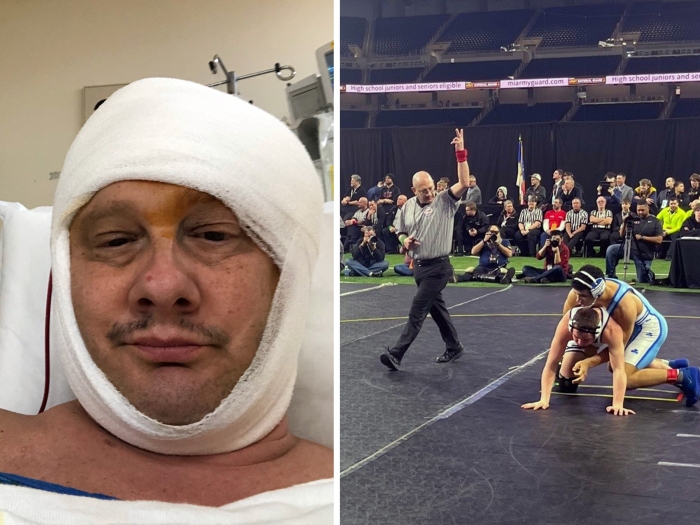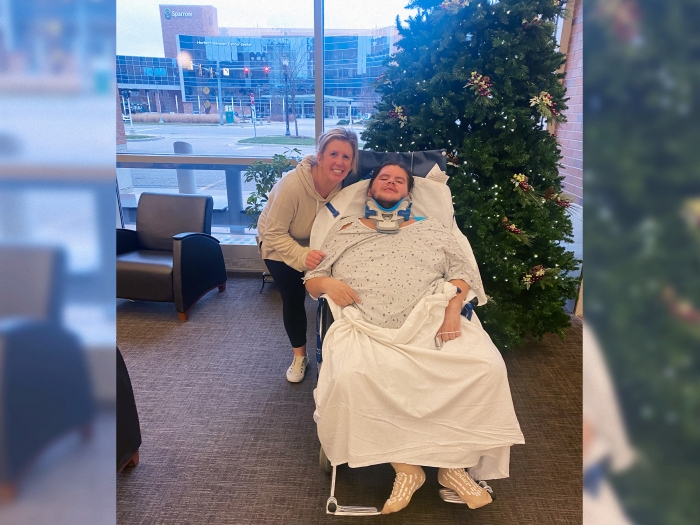Multiple seizures led to the tumor’s discovery
5:00 AM
Author |
A father of two is celebrating nearly one year cancer-free after having an awake brain surgery to remove a tumor that was discovered just a few weeks after the birth of his second daughter.
In late December 2022, Shane and Lexi Smith, both 32, welcomed the arrival of their daughter, Sawyer. Now a family of four, the Smiths enjoyed a brief bout of normalcy at their home in Holly, Mich.
“Other than the lack of sleep that comes with a newborn, I didn’t notice a ton in the first month of her life,” Shane Smith said.
“But one night in January, I was awoken by my wife and paramedics in a state of confusion.”
Smith had never experienced a seizure and assumed he was merely dehydrated or overtired. The paramedics did not end up taking him to the hospital, and, Smith says, his primary care provider said it may have been an episode related to obstructive sleep apnea.
Until it happened a second time two nights later. A third seizure hit while he was en route to the hospital.
“With this illness, it went from zero to 100 overnight,” Lexi Smith said.
“He was a happy, healthy and engaged father. And then: boom.”
Shock of the diagnosis
Shane Smith’s parents met them at the hospital, where Shane was transferred to a neurological unit. After a scan, an oncologist entered the room.
“No one ever thinks they’re going to get cancer,” he said.
“Not only was I trying to process this myself, but my next thought was, obviously, my wife and kids. Am I going to witness my daughters’ high school graduations? Their first dates or weddings? I was already afraid for how they were going to survive after I was gone.”
One week later, Shane Smith was transferred to University of Michigan Health, where he met with neurosurgeon Wajd Al-Holou, M.D.
From an early reading, Al-Holou suspected Smith had a glioma. The most common tumor found within the brain in adults, gliomas, which originate from normal brain cells known as glia, are diagnosed in six per 100,000 Americans each year.
“I did not know what type of glioma it was, and we weren’t going to find out until we performed a surgery to resect it and took a biopsy of the tumor,” Al-Holou said.
SEE ALSO: Lifechanging results for young woman after orange-sized brain tumor removed
Awake brain surgery
To safely remove the tumor, Al-Holou elected to do an awake craniotomy. At U-M Health, the procedure is conducted by a multidisciplinary team with specialization ranging from anesthesiology to neurology and speech language pathology.
Because these tumors are often in critical parts of the brain, the surgical team must identify the location of functions, like language and vision, to ensure they can remove the mass without damaging them.
“In Shane’s case, he presented with a tumor on the left side of his brain which is the dominant hemisphere for language function,” Al-Holou said.
Al-Halou described how he worked with his neuro-epilepsy team, which included Simon Glynn, M.D., speech language pathologist, Karen Kluin, C.C.C.-S.L.P., and a specialized neuro-anesthesia team led by Vijay Tarnal, M.B.B.S.
“We stimulated Shane’s brain while he performed certain tasks such as finger tapping or naming objects. If the task is interrupted when I’m stimulating part of the brain, we know it’s critical. Once we have those areas marked, we can proceed with the resection,” Al-Holou said.
The procedure took place on March 22, 2023. Shane Smith remembers portions of it.
“It’s surreal — it’s like you’re talking and making different actions while your head is cut open and someone is in there playing around with your brain,” he said.
I feel very lucky and privileged to have the opportunity to care for patients in critical, lifechanging times while also seeking new targets for therapies to provide patients with as normal a life as possible after a brain tumor diagnosis.”
--Wajd Al-Holou, M.D.
In many cases, the location of the tumor prohibits the neurosurgeon from removing the entire mass. But, luckily, Al-Holou says he and his team were able to dissect the tumor away from critical language functions near his tumor, and they were able to remove the entire mass.
“Due to the type of tumor, he was diagnosed with and because of his complete resection, Shane did not need to undergo chemotherapy of radiation,” Al-Holou said.
“And because of the extent of the resection, it really provided him the ability to return to his normal life with his family and job without having to worry about this disease for a long time.”
New “normal” at home
Following the surgery, the biopsy revealed the tumor as a grade 2 oligodendroglioma. While still serious, patients with this tumor can often have positive outcomes.
“I didn’t even realize how stressed and anxious I was until we got that news,” Lexi Smith said.
“In that, I knew that our life was going, for the time being, back to normal. And we didn’t have to worry right away.”
Just over a month after the surgery, the Smith family was able to travel to Disney World in Florida. The couple then returned home and to their routine, but Shane Smith’s outlook had forever changed.
“In the past, if something got me down, I would dwell on it for a while,” he said.
“It’s a bit cliché, but this has given me the opportunity to not get upset by the little things. I try to soak up every moment as a husband and father. Just trying to be the best dad I can be.”
The biopsy from Smith’s tumor also served another purpose in research.
Al-Holou is co-director of the Michigan Medicine Multidisciplinary Brain Tumor Clinic, or M3BTC, and director of the Brain Tumor Microenvironment Laboratory at U-M. In addition to treatment, the clinic allows patients the opportunity to participate in cutting edge research and clinical trials.
“I take a sample from the tumors and study it in the laboratory using advanced sequencing technology to try and find vulnerabilities,” Al-Holou said.
“I feel very lucky and privileged to have the opportunity to care for patients in critical, lifechanging times while also seeking new targets for therapies to provide patients with as normal a life as possible after a brain tumor diagnosis.”
Sign up for Health Lab newsletters today. Get medical tips from top experts and learn about new scientific discoveries every week by subscribing to Health Lab’s two newsletters, Health & Wellness and Research & Innovation.
Sign up for the Health Lab Podcast: Add us on Spotify, Apple Podcasts or wherever you get you listen to your favorite shows.

Explore a variety of healthcare news & stories by visiting the Health Lab home page for more articles.

Department of Communication at Michigan Medicine

Want top health & research news weekly? Sign up for Health Lab’s newsletters today!





